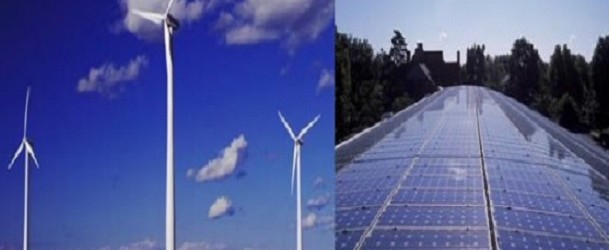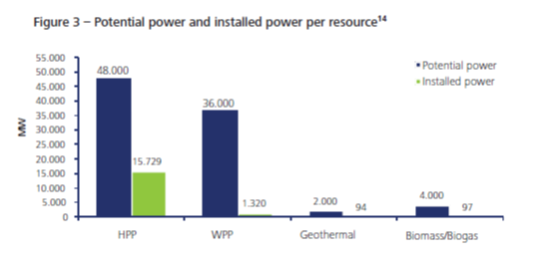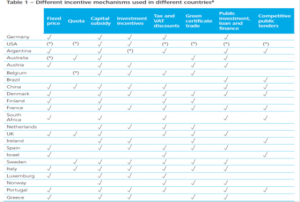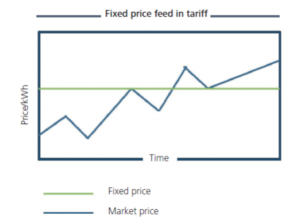Introduction:
Energy security has been played an important role for Turkish domestic and foreign policies. Despite the fact that Turkey has been located in the region where the world’s 70 per cent conventional natural resources are found, Turkey is deprived of energy at the end of the day. Accordingly, Turkey has been developing both domestic and foreign strategies to decrease its energy dependency on foreign countries. On the one hand, Turkey has integrated itself to the interstate pipeline projects to secure oil and natural gas supply. On the other hand, Turkey has been trying to increase the usage of renewables in the total energy consumption while trying to increase energy efficiency in the sector. This paper will focus on the renewable energy strategies of Turkey to decrease the foreign dependency. The first part focuses on the concept of energy security and Turkish energy policies while the second part deals with the renewable energy policies and the current picture of Turkey in the framework of energy efficiency.
The concept of Energy Security and Turkish Energy Strategies:
Energy security is a term used by different depicters with different meanings. Actually the definition of energy security is vague and depends on the definer itself. It may refer to the carbon emissions in Northern Europe while at the same time can refer to diversification of gas supply routes when used in Eastern Europe.[1] The meaning also differs in developed world and developing world. While it means to access to basic supply needs such as clean water, lightening, and public transportation in the underdeveloped parts of the world, it usually refers to the reliability, availability and affordability of the energy supply when used in the developed world.[2] Thus, from an eye of an energy exporter, it means “security of demand and sale of the product at a fair price over a long term” whereas the importer considers it as the security of supply and availability of it at a low price.[3] In short, although the perception of energy security is directly related with the states’ own energy situation/profile yet, today it generally refers to the “continuous availability of energy in varied forms, in sufficient quantities and at a reasonable or affordable price as UNDP defines it.[4]
Today, the world economy is driven by conventional fossil energy resources like coal, natural gas and oil. After 1973 oil shock, energy security and the concept of supply security gained highly importance since high oil prices led to negative impacts on economies like reduction of production and high levels of inflation. Conventional fossil fuels have still the dominant share in energy consumption that created a problem for national and energy security of countries that are lacking oil and natural gas. Turkish primary energy consumption doubled in the years between 1990 and 2007, with high growth rates, economic expansion and increased levels of urbanization. As Turkey is targeting to be one of the most developed economies in the world in the Republic’s 100th establishment anniversary in 2023, energy consumption is going to increase that yields the problem of supply security. According to the TMENR, Turkey’s energy production accounts only 29 % of its total energy demands in 2010. This is one of the main problems of Turkey in terms of energy security that also drives Turkish Foreign Policy.[5] As a country who is highly dependent on foreign energy supplies, supply security is one of the most important issues in Turkish energy policies. Yet, Taner Yıldız, Turkish Minister of Energy and Natural Resources, highlights triple challenge that will drive Turkey’s future energy policies that are achieving substantial reduction of carbon emissions while at the same time ensuring supply security, all at a reasonable price.[6] Therefore, energy efficiency and utilization of renewable resources comes to the picture in energy policies. According to the Strategic Plan, issued in 2010 by TMNER, there are mainly seven targets of Turkey. Those are:
1-) Priority for the usage of domestic energy resources and diversification of energy sources.
2-) Increase in renewable energy’s share in energy supply
3-) Increase in energy efficiency
4-) Liberalization of energy market and enhancement of investments on energy sector
5-) Diversification of importing countries and reduction of import vulnerabilities
6-) Reduction of environmental damages
7-) Being energy transit route and an energy terminal.[7]
Along with the energy supply security, environmental issues is highly important and on the agenda of Turkey since Turkey will be responsible to its emissions indicated in the Kyoto Protocol after 2012. Therefore, energy efficiency, usage of renewable resources, utilization of clean coal technologies and usage of nuclear energy are driving the main targets of Turkey.[8]
Alternative Energy Resources: Renewables
One of the most important policies of Turkey is to increase renewable resources’ share in Turkish energy consumption. As stressed in the Strategic Plan of 2010- 2014 by TMENR, Turkey targeted to increase the share of renewable energy at least 30 % in 2023. Turkey has a great potential in renewable energy yet, it does not use it. In 2010, Turkey had installed power generation capacity of 4,200 MW. In other words, renewable resources accounts for 9 % of Turkey’s total installed power generation capacity.[9] When compared to Turkish potential and installed capacities, it is very obvious that Turkey does not use its potential.
Turkey’s hydroelectric potential is approximately 36.000 MW however its installed capacity is around 41 % of its potential by the end of 2010. Strategic Plan emphasized the target of installing 5.000 MW hydroelectric power by the end of 2013. It also emphasized 10.000 MW installed wind power energy in 2015 and 20 GW of installed wind energy power by 2023 as declared in the Strategic Paper.[11] It is expected that the installed wind power will rise in the future due to the increased interest on it.
Solar energy is another important renewable resource for Turkey. Turkey has been using 12 million m3 solar collectors that are converting solar energy to heat energy. Additionally, Turkey has 1MW installed solar cells for research purposes. Thus, with the amendment of Renewable Energy Law in 2011, feed in tariffs has also been determined for solar energy. Before, it was not determined due to the high costs of solar energy.[12] Turkey has very significant amount of geothermal energy power mostly located in the Western Anatolia. With its potential of 2.000 MW, Turkey is ranked as the fifth biggest geothermal power in the world. Yet, again its installed capacity is 93 MW. In the Electrical Energy Supply Strategic Paper, the target is to have 600 MW installed geothermal power in 2023. Renewable Energy Law separated geothermal power plants from hydroelectric and wind in that geothermal is having a feed in tariff of 10.5 dollar cent/kwh.[13] This will also projected to develop the installed power generating plants in Turkey.
It would be useful, to open up the “feed in tariff” policy/notion. In order to create incentive for investments in renewable energy, states have been creating some incentives to develop the renewable energy sector. According to their economic efficiency and effectiveness, countries adopt the most proper/feasible incentive policies that are stated in the table below.
Turkey has been using feed in tariffs (fixed price guaranties) as an incentive method where for the each type of renewable energy different feed in tariffs are identified. “A feed in tariff provides a means of assuring that the outputs of electricity generators and the system providers will be purchased via the provision of a specific fixed price”. The price should be determined in a way that it should be profitable to the producer. Moreover, the feed in tariffs are provided for a long period of time such as 10-20 years.
In order to increase energy efficiency and usage of renewable energy, Turkey had been adopted laws and regulations such as “Renewable Energy Law” in 2005 and “Geothermal Law” in 2007. Renewable energy Law aims to the efficient usage of energy with low cost and minimum loss. Thus, for energy efficiency, small and medium scale enterprises are being supported.[16] There are incentives for the development of renewable energy in Turkey under various legal provisions including Renewable Energy Law such as: 85 % discount for all “RER Certificated” (renewable energy resource) power plants from rent and servitude for the all electricity generation plants that are active before 31 Dec. 2015; those generation facilities also have a right to use immovable properties such as transportation roads; if they use domestic mechanics or electronic equipments then they can get local equipment bonuses in addition to the feed in tariffs etc.[17] One can say that, Turkey adopted policies to promote the development of renewable energies by giving various rights and also exemptions to the investors.
However, there are some challenges for the development of renewable energy. First of all, there are insufficient feed in tariffs in Turkey compared to other countries. In Turkey, feed in tariffs are generally apply to the 10 year period of the operation that is not meet the investment costs for renewable such as solar and wind energy. Secondly, although Turkey has the world’s seventh geothermal potential, it only uses 7 % of its potential due to high cost of research activities. Thirdly, Turkey’s some energy and environmental policies contradict. For example, Turkey gives priority to the complete /maximum usage of lignite and hydraulic energies instead of renewable energies such as wind and solar energy. Law no 5346 (under Renewable Energy Law) was amended in 2011 in order to allow areas that have legal protection status for the construction of hydroelectric plants. Those can lead to the destruction of biodiversity and fresh water ecosystems.[18] Last but not least, financial incapability is one of the most important issues before R&D activities. Those are some challenges for Turkey to achieve its targets for renewable energies.
While trying to reduce dependence on imported fuels, Turkey now had gave a start to nuclear energy projects. While it eases the burden on imported fuels, it will also contribute to the reduction of carbon emissions that Turkey will be responsible after 2012 since it has been a party to Kyoto Protocol.[19] Actually Turkey has a long nuclear energy history starting from 1956 with the establishment of Atomic Energy Commission. Finally in 2010, with the agreement between Turkish and Russian governments, Akkuyu Nuclear Power Plant Electricity Production Corporation was established. It will be the first nuclear power plant of Turkey and Turkey aims to integrate nuclear energy in its electricity production at least 5 % until 2020.[20] Actually, Turkey has very significant amount of energy resources for its nuclear power plant such as natural uranium (9.129 tons) and thorium (380.000 tons) reserves that Turkey has significant amounts.[21] Thorium can be used as nuclear fuel instead of Uranium 235 because thorium is less harmful for environment and is very efficient. It is quite common in Turkey especially around Eskisehir- Sivrihisar having 380.000 tons of thorium reserves.[22]
In the long run, Turkey may adopt laws to increase nuclear and renewable energies share in its electricity production whereas aiming to decrease the share of natural gas which is not cost efficient.[23] Thus, Turkey is giving importance to domestic coal for its electricity production. Renewable Energy Law is one of the most important regulations showing the incentive of the government to promote renewable energy.
Turkey has been improving its legislation infrastructure for a more liberal and competitive energy market. Legal infrastructure is very important both for more efficient energy policies and for refreshing the investments in energy sector. Those settlements starting mainly from 2001 with “Energy Market and Natural Gas Law” also pave the way for a more efficient energy market and also more sustainable energy policies.[24] Some of them are; Petroleum Law (2003), Renewable Energy Resources Law for the usage of Electricity Production (2005), Energy Efficiency Law (2007).[25]
Along with the nuclear and renewable energy alternatives, Turkey is aware of the importance of energy efficiency to secure its energy needs. The definition of energy efficiency is the reduction of energy usage to its minimum level without reducing the “standard of living, the production quality and the most effective use of the energy resources”. One of the determinants/ measures of energy security is to look at energy intensity of the country “which is the amount of energy used to produce a dollar’s worth of gross domestic product”.[26] We can see that Turkey’s energy intensity is higher than OECD countries which mean that Turkey is not very good at efficient usage of energy.
Turkey has been planning to reduce its energy intensity about 20 % in 2023. To do it, Energy Efficiency Law was adopted in 2007 in order to regulate the rules for management of energy in industry and large buildings etc. The aim of the law is to reduce energy intensity and to get maximum benefit from it. It also indirectly supports energy efficiency projects. This will also show itself with the National Energy Efficiency Movement adopted in 2008. Thus, investment supports for energy projects are provided by The General Directorate of Electric Power Resources, Survey and Development Administration (EİE).
Turkey has been adopted various regulations to increase energy efficiency in the sectors such as transportation; buildings and domestic appliances and in industry. Thus, it also tries to increase the energy efficiency consciousness by demanding from local and metropolitan municipalities to organize energy efficiency programs annually in the second week of January (second week of January is determined as energy efficiency week).[27] It also encourages public sector to create education and consciousness programs. “Elele Enver” is one of the most important projects started in 2008 by EİE. It aims to disseminate the energy saving bulbs to primary school students in 81 provinces and to awake the attention of energy efficiency among people.[28]
Maybe another aspect of energy efficiency is to reduce the losses and also to develop a convenient energy market to increase competition that will also lead to a more efficient system. According to the TMENR, Turkey has reduced losses during the various stages such as transmission, distribution and production from 21 % to 15 % when we look at the 2002 and 2011 statistics. It also aims to establish a more competitive energy market and wants to increase the share of private sector from 34 % (2002) to 52 % (2011).[29] The aim of the energy ministry is to reduce losses, increase service quality and investments.
Last but not least, coal energies occupy a crucial place for the economic development of the countries and Turkey has significant coal reserves indeed. The government has been trying to increase the usage of domestic coal at power plants, privatize the inefficient coal mines, develop existing indigenous resources, increase the usage of lignite and hard coal reserves for electricity production and promote clean coal technologies in the thermal power plants, households and industry. To meet the electricity demand, Turkey has been expanding the coal fired power plants. However it will also bring environmental and global warming problems. Although Turkey has significant amount of coal, it does not have sufficient amount of clean coal production technologies. Yet, those technologies provide a change to use it in a very environmentally friendly manner. Turkish government has been taken important steps to reduce the environmental damage. Since 2005, it has been tried to increase the efficiency of current coal fired plants besides introducing stricter environmental norms and standards. [30]
Conclusion:
In 21st century, Turkey has become an important energy crossroad and also aims to enhance its influence in energy politics in its region. Yet, Turkey has been facing challenges. Those challenges are related with domestic and foreign reflections of energy security in Turkish energy politics.
In domestic policies, Turkey has recently started to liberalize its energy market, and gave importance to the supply diversification. In that sense, renewable, nuclear and coal energies play a vital role for Turkish energy security. Energy Efficiency Strategy Paper which was published in 2011 also stresses Turkey’s attempts and future roadmap which aims to have energy efficiency in various sectors such as industry, service, transportation and public sector. Those policies concerning the usage of renewable energies should be enhanced in the near future and should be supported financially, socially and politically.
Tülin AVCI
Bibliography
- Balat, Mustafa. “Security of Energy Supply in Turkey: Challenges and Solutions”. Energy Conversion and Management 52, (2010): 1998-2011.
- “Birinci Ulusal Enerji Verimliliği Forumu.” 27 Kasım 2008, http://www.uevf.com.tr/uevf1/index.asp?sf=0&haberid=759
- Birsellioğlu, Mehmet Efe. Euroepan Energy Security: Turkey’s Future Role and Impact. UK: Palgrave, 2011.
- Coşkun, Bazen Balamir, and Richard Carlson. “New Energy Geopolitics: Why Does Turkey Matter?”Insight Turkey 12, no.3 (2010): 205-220.
- Çengel, Y.A. “Energy Efficiency as an Inexhaustible Energy Resource with Perspectives from the US and Turkey”. International Journal of Energy Research. 35 (2011): 153-161.
- Deloitte. New Life for Renewable Energy Resources: Renewable Energy Policies and Expectations. Turkey, 2011.
- Enerji ve Tabii Kaynaklar Bakanlığı. Nükleer Santraller ve Ülkemizde Kurulacak Nükleer Santrale İlişkin Bilgiler.
- Enerji ve Tabii Kaynaklar Bakanlığı. 2010-2014 Stratejik Plan. 2010.
- Enerji ve Tabii Kaynaklar Bakanlığı. Türkiye Enerji Politikalarımız. Ankara, 2011.
- IEA. Turkey 2009 Review. Paris, 2010.
- Keskin, M. Tülin, and Halil Ünlü. Türkiye’de Enerji Verimliliğinin Durumu Ve Yerel Yönetimlerin Rolü. İstanbul: Heinrich Böll Stiftung Derneği, 2010.
- Luft, Gal ,and Anne Korin, eds. Energy Security: In the Eyes of the Beholder. California: Praeger Security International, 2009.
- “Nükleer Kaynaklar (Toryum ve Uranyum)” Marbleport.com, http://www.marbleport.com/dogal-kaynaklar/81/nukleer-kaynaklar-toryum-ve-uranyum.
- Ozkan, Ece. “Energy Geopolitics: Turkey’s Role as an Energy Hub vis-a-vis Russia’s Dominance on the Natural Gas Exporters to the Euroepan Union”. MA thesis, New York University, 2010.
- WWF. Yenilenebilir Enerji Geleceği ve Türkiye. Türkiye, 2011.
- Yazar, Yusuf. Türkiye’nin Enerji Durumu Ve Geleceği. SETA Analiz 31, 2010.
- Yıldız, Taner. “Turkey’s Energy Policy, Regional Role and Future Energy Vision”. Insight Turkey 12, no.3 (2010):33-38.
[1] Bezen Balamir Coşkun and Richard Carlson, “New Energy Geopolitics: Why Does Turkey Matter?”, Insight Turkey, 12, no.3 (2010): 205.
[2] Ece Ozkan, “Energy Geopolitics: Turkey’s Role as an Energy Hub vis-a-vis Russia’s Dominance on the Natural Gas Exporters to the Euroepan Union” (MA Thesis, New York University, 2010): 14.
[3] Gal Luft and Anne Korin, eds., Energy Security: In the Eyes of the Beholder (California: Praeger Security International, 2009), 6.
[4] Mustafa Balat, “Security of Energy Supply in Turkey. Challenges and Solutions” Energy Conversion and Management, 51 (2010): 2002.
[5] Enerji ve Tabii Kaynaklar Bakanlığı, Türkiye Enerji Politikalarımız, Ankara, 2011.
[6] Taner Yıldız, “Turkey’s Energy Policy, Regional Role and Future Energy Vision”, Insight Turkey 12, no.3 (2010) :33.
[7] Enerji ve Tabii Kaynaklar Bakanlığı, 2010-2014 Stratejik Plan, 2010.
[8] Enerji ve Tabii Kaynaklar Bakanlığı, Nükleer Santraller ve Ülkemizde Kurulacak Nükleer Santrale İlişkin Bilgiler http://www.enerji.gov.tr/yayinlar_raporlar/Nukleer_Santraller_ve_Ulkemizde_Kurulacak_Nukleer_Santrale_Iliskin_Bilgiler.pdf
[9] Deloitte, New Life for Renewable Energy Resources: Renewable Energy Policies and Expectations, Turkey, 2011.
[10] Deloitte, New Life for Renewable Energy Resources: Renewable Energy Policies and Expectations, Turkey, 2011.
[11] Ibid, 19.
[12] Deloitte, New Life for Renewable Energy Resources: Renewable Energy Policies and Expectations, Turkey, (2011): 21.
[13] Ibid, 21.
[14] Deloitte, New Life for Renewable Energy Resources: Renewable Energy Policies and Expectations, Turkey, 2011.
[15] Deloitte, New Life for Renewable Energy Resources: Renewable Energy Policies and Expectations, Turkey, 2011.
[16] WWF, Yenilenebilir Enerji Geleceği ve Türkiye, Türkiye, (2011): 8.
[17] Deloitte, New Life for Renewable Energy Resources: Renewable Energy Policies and Expectations, Turkey, (2011): 25-27.
[18] WWF, Yenilenebilir Enerji Geleceği ve Türkiye, Türkiye, (2011): 10-11.
[19] Taner Yıldız, “Turkey’s Energy Policy, Regional Role and Future Energy Vision”, Insight Turkey 12, no.3 (2010): 36.
[20] Enerji ve Tabii Kaynaklar Bakanlığı, Nükleer Santraller ve Ülkemizde Kurulacak Nükleer Santrale İlişkin Bilgiler, p.29.
[21] Tülin M. Keskin and Halil Ünlü, Türkiye’de Enerji Verimliliğinin Durumu Ve Yerel Yönetimlerin Rolü, İstanbul: Heinrich Böll Stiftung Derneği, (2010): 27.
[22] “Nükleer Kaynaklar (Toryum ve Uranyum)” Marbleport.com, http://www.marbleport.com/dogal-kaynaklar/81/nukleer-kaynaklar-toryum-ve-uranyum.
[23] Yusuf Yazar, “Türkiye’nin Enerjideki Durumu ve Geleceği”, SETA Analiz, 31 (2010): 14.
[24] Yusuf Yazar, “Türkiye’nin Enerjideki Durumu ve Geleceği”, SETA Analiz, 31 (2010): 22.
[25] Ibid, 11.
[26] Y. A. Çengel, “Energy Efficiency as an Inexhaustible Energy Resource with Perspectives from the US and Turkey”, International Journal of Energy Research, 35 (2011): 154-156.
[27] Tülin M. Keskin and Halil Ünlü. Türkiye’de Enerji Verimliliğinin Durumu Ve Yerel Yönetimlerin Rolü. İstanbul: Heinrich Böll Stiftung Derneği, (2010): 55.
[28] “1. Ulusal Enerji Verimliliği Forumu.” Kasım 27 2008, http://www.uevf.com.tr/uevf1/index.asp?sf=0&haberid=759
[29] Enerji ve Tabii Kaynaklar Bakanlığı, Türkiye Enerji Politikalarımız, Ankara, (2011): 20-33.
[30] IEA. Turkey 2009 Review, Paris, 2010: 89-90.




























































